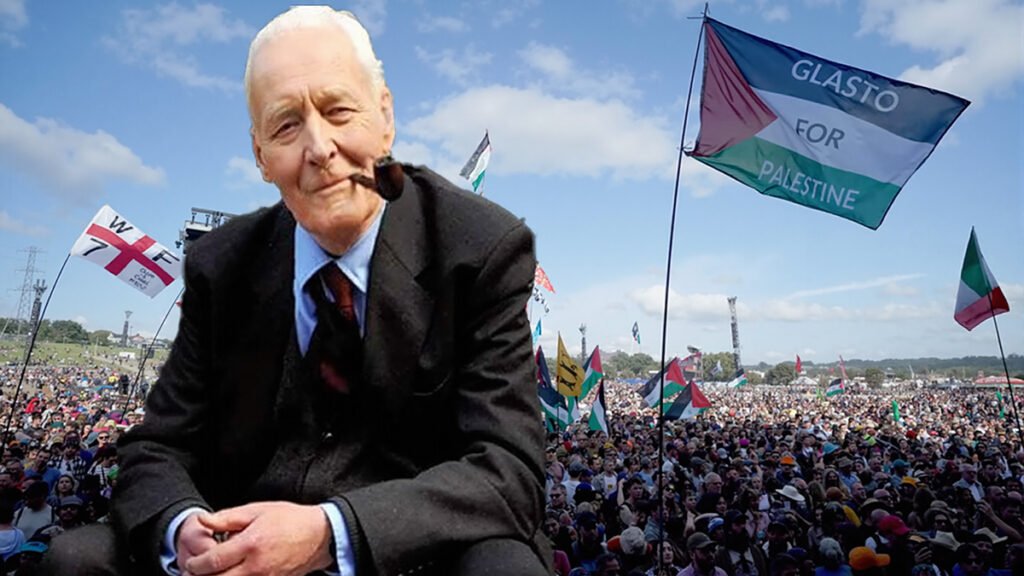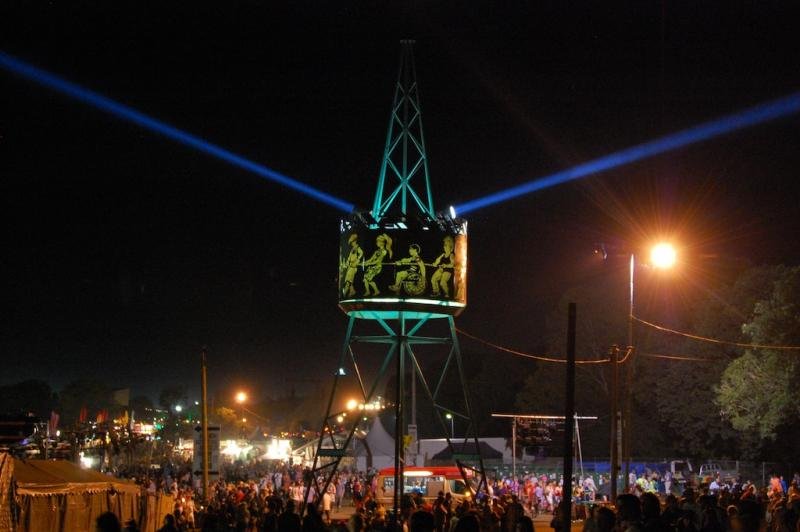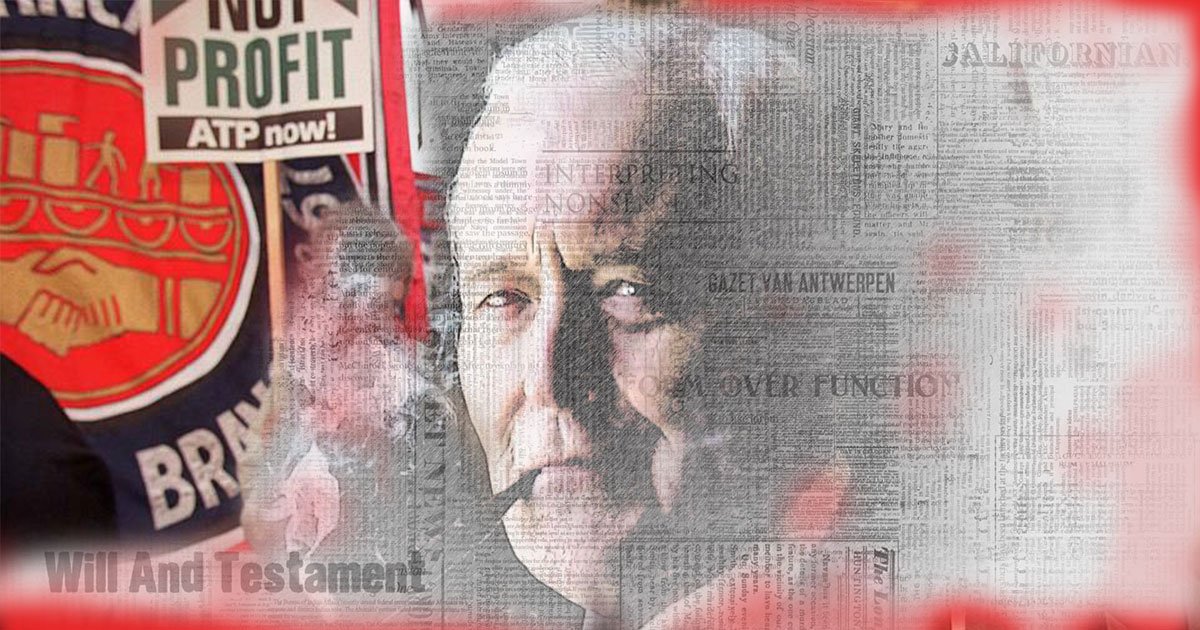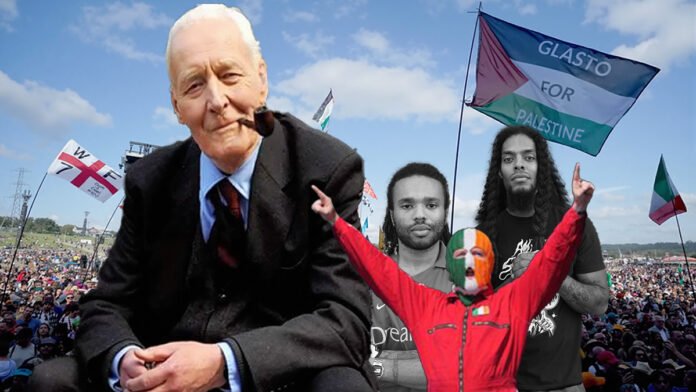Glastonbury: The Tony Benn Years and the Spirit of Resistance
Beyond the sanitised BBC broadcast, Glastonbury is more than a music festival it is the gathering of tribes, the heartbeat of rebellion, the drumbeat of dissent that echoes through Avalon’s ancient fields. Rooted in myth, soaked in counterculture, Glastonbury acts as a conscience of the people, a wild communion of music, myth, and meaning where politics is not avoided, but embraced with muddy boots and open hearts.
Glastonbury’s power isn’t just musical, isn’t just spiritual, it’s political, reaching back to layers of history that predate Westminster by millennia. This is sacred ground, where the ancient and modern collide, where Arthurian ideals of just rule merge with dreams of socialism, where the mythic and the political become indistinguishable.
The festival sits on Avalon, the island of the blessed, where legends speak of the once and future king who will return to heal the land’s corruption. Today, it’s where political movements come to be reborn, where the dead weight of Westminster cynicism falls away, and where hope becomes possible again.
🌹 A Tower of Strength at the Heart of the Festival
There’s something profound about politics conducted under open sky, on land that has witnessed the rise and fall of abbeys and empires, the ebb and flow of faiths and revolutions. Land that knows the rhythm of seasons and the cycles of growth and decay. It reminds us that political power is temporary, that movements outlast politicians, and that the earth itself has a vote in humanity’s future.
From the stone circles to the Pyramid Stage, the land remembers. It remembers spiritual awakenings and working-class voices who dared to speak truth to power. That tradition of defiance found its truest political voice that came from Tony Benn.
Tony Benn wasn’t just a festival speaker, he was a pilgrimage.

Tony Benn understood that Glastonbury represented something precious: a space where politics could be joyful, where socialism could be celebrated, where hope wasn’t naive but revolutionary. His presence blessed the festival with something Westminster lacks authenticity.
Benn knew that real change comes from below, from people gathering in fields and factories, in pubs and public squares, anywhere the human spirit refuses to be crushed by corporate machinery. He saw in Glastonbury what the establishment fears: the possibility of politics conducted outside their control a place of ideas, of shouted truths.
These voices gather and talked in purpose built area the Left Field, Benn spoke not like a politician, but like a prophet of justice. He reminded the young and old alike that democracy must be defended, that socialism was not a dirty word, and that hope was a revolutionary act. He called on us to organise, to resist, and to remember: the real division in society isn’t between left and right, but between top and bottom.
His words lit fires in the minds of a generation who danced and dreamed under his gaze.
When he died in 2014, Glastonbury responded not with silence but with steel. The Left Field Tower, a towering 21-metre structure originally built by shipyard workers from Appledore fighting redundancy, was renamed the Tony Benn Tower. A tribute forged from struggle and solidarity, a monument not of stone, but of spirit.

Festival founder Michael Eavis said Benn was a “true friend of the festival.” His daughter Emily wrote in the programme:
He was a true inspiration… a regular speaker in the Left Field, he loved coming here every year.
Indeed, he did. Because Glastonbury, at its radical roots, isn’t just a party, it’s politics with poetry.
His tower isn’t just a memorial, it’s a rebel’s beacon, scouring the horizon for the next spark of insurrection, the next generation of revolutionaries who refuse to kneel, who’ll tear down the lies, rip up the script, and shout: we were born for more than this. And every year, it finds them.
Corbyn, Gaza, and Glastonbury 2025
In 2017, Jeremy Corbyn, a man who echoed many of Benn’s values, stood on the Pyramid Stage and addressed one of the largest crowds in Glastonbury history. The roar that greeted him wasn’t just for a politician, it was for the possibility of politics itself. For the radical idea that government might serve people rather than profit, that Britain might choose justice over jingoism.
He spoke of peace, justice, and a different kind of politics. The roar that met him wasn’t for a rock star, it was for hope itself.,
That roar still echoes across these fields, even as Starmer’s authoritarian drift tries to silence it.
In an age when Westminster has become a theatre of performative cruelty, when politicians criminalise conscience and rebrand protest as terrorism, Glastonbury remains what democracy should be: messy, loud, uncomfortable, and real. In the Somerset mud, you’ll find more genuine political discourse in a single weekend than in a year of parliamentary debates.
This isn’t the sanitised democracy of focus groups and polling data. This is the raw, unfiltered voice of people who still believe change is possible, who refuse to accept that austerity, war, and inequality are inevitable. It’s democracy as the ancient Greeks imagined it the people gathering to argue, to dream, and to decide their collective fate.
The establishment hates this, of course. They prefer their entertainment politically neutered, their festivals focused on brand partnerships rather than human rights. They want Glastonbury to be another corporate playground where the wealthy can party while the world burns.
But Glastonbury’s mud runs deeper than their money. Its roots reach back to traditions of resistance that no amount of corporate sponsorship can sever.
Gaza, Conscience, and the Weight of History
While Keir Starmer’s Labour criminalises Palestine Action activists and brands dissent as extremism, Glastonbury celebrates the tradition of resistance that built everything decent about Britain. Every suffragette who chained herself to railings, every miner who stood against Thatcher’s assault, every peace activist who cut through Greenham Common’s fences, their spirit lives on in these fields.
This year Glastonbury 2025 carries a heavier burden than usual. As Israel’s genocide in Gaza unfolds with British weapons and American blessing, as children die under bombs paid for with our taxes, the festival has become a focal point for conscience in an unconscionable time.
Artists have raised their voices, speakers have called for justice, and the Palestine flag flies over Worthy Farm like a banner of resistance. This isn’t trendy activism or celebrity virtue-signalling, it’s the festival fulfilling its deepest purpose as a space where uncomfortable truths can be spoken and heard.
The establishment hates this, of course. They prefer their entertainment politically neutered, their festivals focused on brand partnerships rather than human rights. They want Glastonbury to be another corporate playground where the wealthy can party while the world burns.
But Glastonbury’s mud runs deeper than their money. Its roots reach back to traditions of resistance that no amount of corporate sponsorship can sever.
Kneecap vs. The Machine
This controversy around Belfast rap trio Kneecap perfectly encapsulates what Glastonbury means in the current political moment. When Prime Minister Starmer tried to pressure the festival to drop them from the line-up, Glastonbury stood firm. When the establishment demanded silence, the festival chose solidarity.
Their chants were loud, unfiltered, and politically charged, an eruption of anger from a generation who see through the lies.
Rapper Mo Chara, charged last year over displaying a Hezbollah flag (a charge he denies), thanked Glastonbury for keeping them on the bill despite government pressure. From the stage, they reminded the audience:
“The prime minister of your country—not mine—said he didn’t want us to play.”
The BBC refused to live stream Kneecap’s performance on the West Holts stage at Glastonbury. BBC spokesperson has said: “As the broadcast partner, the BBC is bringing audiences extensive music coverage from Glastonbury, with artists booked by the festival organisers. Whilst the BBC doesn’t ban artists, our plans ensure that our programming meets our editorial guidelines.”
But they played anyway. And in doing so, reminded us why Glastonbury matters.
The Sanitization Machine in Overdrive
But Kneecap weren’t alone in causing Westminster’s collective pearl-clutching. Rap punk duo Bob Vylan took to the same West Holts stage and led chants of “free, free Palestine” and “death, death to the IDF” that sent shockwaves through the establishment.
The response was swift and telling. The government “strongly condemned” the performance. Culture Secretary Lisa Nandy personally called BBC director general Tim Davie demanding an “urgent explanation.” The BBC branded the comments “deeply offensive” and banned the performance from iPlayer. Police announced they were “reviewing footage” to determine if criminal offences had been committed.
All this for a band expressing solidarity with Palestine and opposition to military forces committing genocide. In Tony Benn’s Britain, this would have been called speaking truth to power. In Starmer’s Britain, it’s treated as potential terrorism.
The contrast couldn’t be starker. While Israel’s military drops bombs on Palestinian children using F-35 fighter jets and drones containing British-made components, while the UK government provides intelligence from spy flights over Gaza and the West Bank to Israeli forces, the real outrage isn’t the mass killing, it’s the musicians who dare to name it. While our government enables genocide through arms components and intelligence sharing, the criminal investigation targets those who oppose it.
This is how authoritarian creep works: not through dramatic announcements, but through the gradual redefinition of acceptable speech. Today it’s “death to the IDF” that triggers police investigations. Tomorrow it’ll be “free Palestine.” Eventually, it’ll be any criticism of government policy that makes ministers uncomfortable.
Is Israel not a foreign state? Are British citizens no longer allowed an opinion on foreign governments and their military forces?
The establishment’s panic reveals their fear. Not of Bob Vylan’s words, but of what those words represent: a generation that sees through their lies, refuses to be silenced, and understands that sometimes the most patriotic thing you can do is oppose your own government’s crimes.
The Left Field Lives On

The Left Field still flies its banners. The Tony Benn Tower still watches over the fields. And somewhere in the Somerset mud, the spirit of resistance that built everything decent about Britain lives on.
Festival-goers will return to their daily lives, back to the grind of work and bills and compromise. But they’ll carry something with them: the memory of what it feels like when politics has soul, when music has meaning, when hope isn’t foolish but fundamental.
In Benn’s words:
Hope is the fuel of progress. Fear is the prison in which you put yourself.
Tony Benn
Glastonbury is where hope comes to dance, to sing, to shout at the sky. And in times like these, that might be the most revolutionary act of all.
So raise a glass to Tony. Raise your voices for Palestine. And remember, festivals may fade, but the fight for justice never ends. The mud washes off, but the memory of what’s possible remains forever. God I hope it rains…
Cheers, Tony…
Support Independent Journalism Today
Our unwavering dedication is to provide you with unbiased news, diverse perspectives, and insightful opinions. We're on a mission to ensure that those in positions of power are held accountable for their actions, but we can't do it alone. Labour Heartlands is primarily funded by me, Paul Knaggs, and by the generous contributions of readers like you. Your donations keep us going and help us uphold the principles of independent journalism. Join us in our quest for truth, transparency, and accountability – donate today and be a part of our mission!
Like everyone else, we're facing challenges, and we need your help to stay online and continue providing crucial journalism. Every contribution, no matter how small, goes a long way in helping us thrive. By becoming one of our donors, you become a vital part of our mission to uncover the truth and uphold the values of democracy.
While we maintain our independence from political affiliations, we stand united against corruption, injustice, and the erosion of free speech, truth, and democracy. We believe in the power of accurate information in a democracy, and we consider facts non-negotiable.
Your support, no matter the amount, can make a significant impact. Together, we can make a difference and continue our journey toward a more informed and just society.
Thank you for supporting Labour Heartlands












